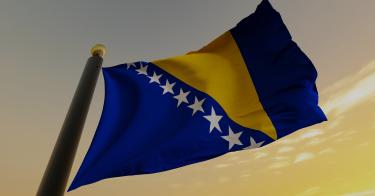Commemorations have begun to note the thirtieth anniversary, which ended the 1992–1995 Bosnian War that left 100,000 people dead. Yet, there is little to celebrate in what has become a divided today as they were in 1995. The Serb-majority parts of the country persistently seek to break away and join neighboring Serbia. Prior to the war, mixed marriages accounted for 13 percent of all marriages. Today, that figure stands at 4 percent. Efforts by outsiders to impose a Bosnian civic identity to replace the centuries-honed ethno-religious affiliations have fallen flat.
Earlier this month, the international community’s Office of High Representative (OHR) to Bosnia and Herzegovina, led by a former German minister of agriculture, reported to the United Nations Security Council that the situation “without question amounts to an extraordinary crisis in the country since the signing of the Dayton Agreement.”
Yet, the essence of the crisis lies specifically in the post-peace accord’s international architecture that empowered a clique of Western diplomats as final arbiters of all decisions in the country. Jealously guarding their powers, Bosnia and Herzegovina enjoys no national sovereignty.
>>> Pakistan’s Terror Challenge Isn’t Just India’s Problem
Successive High Representatives have imposed over 900 decisions, ranging from the selection of state symbols to economic policy to judicial and constitutional reform. Through fiat, the High Representative has removed numerous elected officials, including presidents.
Three of the nine seats on the Supreme Court are reserved for foreign jurists (currently from Albania, Germany, and Switzerland) who often rule in favor of centralizing power in Sarajevo, where the Bosniak Muslim majority controls most federal institutions.
International efforts to “centralize Bosnia in a way that was not explicitly outlined by the peace accords” at the expense of Serbian autonomy are a political non-starter and have provided Moscow a permanent opening to destabilize the region.
In the other half of the country, where Muslims outnumber Catholic Croats three to one, Muslims engage in cross-over voting to elect Croats, as well as minority representatives, disenfranchising the country’s pro-Western bloc. The Croat leader, moreover, has been threatened with sanctions by the United States for opposing a gas pipeline project that would be managed by the Bosniak-Muslim-led state-owned gas company but built in Croat-populated areas.
In sum, there exists no political or civic space where the people of Bosnia and Herzegovina can govern themselves. Is it any wonder why inter-ethnic relations are at their worst?
What originally began as “an ad hoc international institution” to help the new country “evolve into a peaceful and viable democracy,” has seen the OHR morph into a modern-day European Raj in perpetuity “with no checks and balances…and no accountability whether locally or internationally.” At least the British Raj left India with strong legal and democratic institutions. This Raj has created a cadre of well-financed NGOs that represent the interests of the international community, not those of the country.
Every international intervention exacerbates ethnic relations and retards the development of Bosnia and Herzegovina’s democratic institutions. Parties seek redress of their grievances not through negotiation amongst themselves but externally, as sovereignty lies with foreign bureaucrats, not their own elected leaders.
In his recent remarks in Saudi Arabia, President Trump contrasted the prosperity and stability of the Gulf states with “the so-called nation-builders [who] wrecked far more nations than they built.” Bosnia and Herzegovina is one of those wrecked states.
>>> South Korea’s Political Crisis
The president has a historic opportunity to end this farce. While European diplomats are the face of this post-Dayton construct, none of their actions take place without the explicit approval of the US government.
For good reason. The OHR’s powers derive not from Dayton but from a consortium of 55 countries and international organizations established soon after and separate from the accord itself. It empowered the OHR “to make binding decisions, as he judges necessary.” Hence, there is no firm legal basis for it. The unbounded authorities of this entire foreign-run enterprise are built on a juridical house of cards.
President Trump could provide Bosnia and Herzegovina a fresh start by refusing to renew the OHR’s authorities and letting it, along with the three foreign supreme court judges, the bottom-feeding web of NGOs, and this last vestige of nation-building, lapse into the dustbin of history. A simple federal system based on the three constituent peoples that restores to them the sovereign power to resolve their own differences is what will reduce inter-ethnic tensions, as it has elsewhere in Europe—think Switzerland and Belgium—rather than foreign interference.
Three decades of international interventionism have failed to help the country “evolve into a peaceful and viable democracy.” Perhaps we ought to let the people of Bosnia and Herzegovina give it a try.
This piece originally appeared in The National Interest https://nationalinterest.org/feature/nation-building-in-bosnia-and-herzegovina-30-years-of-failure




